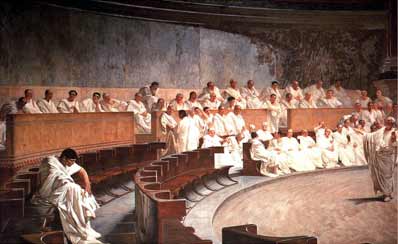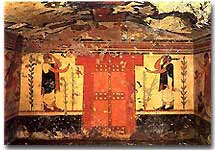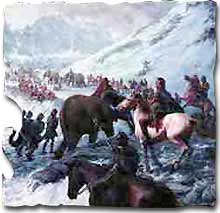They Had a Senate Made Up of __________ Who Were Members of Wealthy Families.

6a. The Roman Republic
The Romans established a form of government — a commonwealth — that was copied by countries for centuries In fact, the government of the United states of america is based partly on Rome's model.

The ladder to political power in the Roman Senate was different for the wealthy patricians than for the lower-class plebeians.
It all began when the Romans overthrew their Etruscan conquerors in 509 B.C.Eastward. Centered north of Rome, the Etruscans had ruled over the Romans for hundreds of years.
Once free, the Romans established a commonwealth, a government in which citizens elected representatives to dominion on their behalf. A commonwealth is quite unlike from a republic, in which every citizen is expected to play an agile role in governing the country.
Citizen
The Roman concept of the citizen evolved during the Roman Republic and changed significantly during the later Roman Empire. Subsequently the Romans freed themselves from the Etruscans, they established a republic, and all males over 15 who were descended from the original tribes of Rome became citizens. Citizens of Rome distinguished themselves from slaves and other noncitizens by wearing a toga; about wore a white toga. During the Empire, each emperor wore a purple toga to distinguish himself every bit the princeps, or "first denizen."
Citizenship varied profoundly. The full citizen could vote, marry freeborn persons, and practice commerce. Some citizens were non immune to vote or hold public office, just maintained the other rights. A 3rd type of citizen could vote and practive commerce, only could not hold office or marry freeborn women.
In the belatedly Republic, male slaves who were granted their freedom could become total citizens. Around 90 B.C.East., non-Roman allies of the Democracy gained the rights of citizenship, and by 212 C.East, under the Edict of Caracalla, all free people of the Roman Empire could become citizens.

Frescoes line the walls of long-forgotten Etruscan tombs. This painting, establish in the Tomb of Augurs in Tarquinia, is titled Hell's Door.
The elite (wealthy class) dominated the early on Roman Democracy. In Roman lodge, the aristocrats were known as patricians. The highest positions in the regime were held by ii consuls, or leaders, who ruled the Roman Republic. A senate composed of patricians elected these consuls. At this time, lower-form citizens, or plebeians, had almost no say in the authorities. Both men and women were citizens in the Roman Republic, only only men could vote.
Tradition dictated that patricians and plebeians should be strictly separated; marriage betwixt the ii classes was even prohibited. Over time, the plebeians elected their own representatives, chosen tribunes, who gained the power to veto measures passed past the senate.
Gradually, the plebeians obtained even more than ability and eventually could hold the position of consul. Despite these changes, though, the patricians were still able to use their wealth to buy control and influence over elected leaders.

Hannibal marched his elephants south into the Italian peninsula during the Second Punic War.
The Roman Senate
The history of the Roman Senate goes as far dorsum equally the history of Rome itself. It was first created equally a 100-member advisory group for the Roman kings. Later on kings expanded the group to 300 members. When the kings were expelled from Rome and the Democracy was formed, the Senate became the most powerful governing torso. Instead of advising the head of country, it elected the chief executives, chosen consuls.
Senators were, for centuries, strictly from the patrician course. They practiced the skills of rhetoric and oratory to persuade other members of the ruling body. The Senate convened and passed laws in the curia, a large building on the grounds of the Roman Forum. Much later, Julius Caesar built a larger curia for an expanded Senate.
Past the 3rd century B.C.E., Rome had conquered vast territories, and the powerful senators sent armies, negotiated terms of treaties, and had full control over the financial matters of the Democracy.
Senatorial control was somewhen challenged by Dictator Sulla around 82 B.C.E. Sulla had hundreds of senators murdered, increased the Senate's membership to 600, and installed many nonpatricians as senators. Julius Caesar raised the number to 900 (it was reduced after his assassination). Afterward the cosmos of the Roman Empire in 27 B.C.E., the Senate became weakened under strong emperors who often forcefully coerced this ruling torso. Although it survived until the fall of Rome, the Roman Senate had go just a ceremonial body of wealthy, intelligent men with no power to rule.
Occasionally, an emergency situation (such every bit a war) arose that required the decisive leadership of one individual. Under these circumstances, the Senate and the consuls could appoint a temporary dictator to rule for a limited time until the crisis was resolved. The position of dictator was very undemocratic in nature. Indeed, a dictator had all the power, made decisions without whatsoever approval, and had full control over the military.
The all-time case of an ideal dictator was a Roman citizen named Cincinnatus. During a severe military emergency, the Roman Senate called Cincinnatus from his farm to serve every bit dictator and to lead the Roman army. When Cincinnatus stepped down from the dictatorship and returned to his farm simply xv days after he successfully defeated Rome'due south enemies, the republican leaders resumed command over Rome.

The Twelve Tables
One of the innovations of the Roman Republic was the notion of equality under the law. In 449 B.C.E., government leaders carved some of Rome's most important laws into 12 great tablets. The Twelve Tables, as they came to be known, were the start Roman laws put in writing. Although the laws were rather harsh past today's standards, they did guarantee every denizen equal treatment under the police force.
Laws from the Twelve Tables
With respect to the law and citizenship, the Romans took a unique approach to the lands that they conquered. Rather than rule those people every bit conquered subjects, the Romans invited them to go citizens. These people so became a part of Rome, rather than enemies fighting against information technology. Naturally, these new citizens received the same legal rights equally anybody else.
The Punic Wars
The early Roman Republic oft found itself in a land of constant warfare with its surrounding neighbors. In one case, when the Romans were fighting the Carthaginians, Rome was nearly conquered. The people of Carthage (a city in what is today Tunisia in north Africa) were a successful trading civilisation whose interests began to conflict with those of the Romans.
The two sides fought 3 bloody wars, known as the Punic Wars (264-146 B.C.Eastward.), over the command of trade in the western Mediterranean Body of water. In the 2nd war, Hannibal, a Carthaginian general, successfully invaded Italy past leading an army — complete with elephants — across the Alps. He handed the Roman regular army a crushing defeat just was unable to sack the city of Rome itself. After occupying and ravaging Italy for more than a decade, Hannibal was finally defeated past the Roman general Scipio at the Battle of Zama in 202 B.C.East.
Why "Punic"?
How did the word "Punic" become an adjective pregnant "relating to the people of Carthage"?"Punic" is derived from the Latin word Poenicus, meaning "an inhabitant of Carthage." Carthage was founded by Phoenicians, and Poenicus is the Latin word for "Phoenician."
By the Third Punic War, Rome was ready to end the Carthaginian threat for good. Later on a successful several-yr siege of Carthage, the Romans burned the city to the basis. Legend has information technology that the Romans then poured salt into the soil so that nothing would e'er grow there again. Carthage was finally defeated, and the Roman Democracy was condom.
Source: https://www.ushistory.org/civ/6a.asp
0 Response to "They Had a Senate Made Up of __________ Who Were Members of Wealthy Families."
Postar um comentário